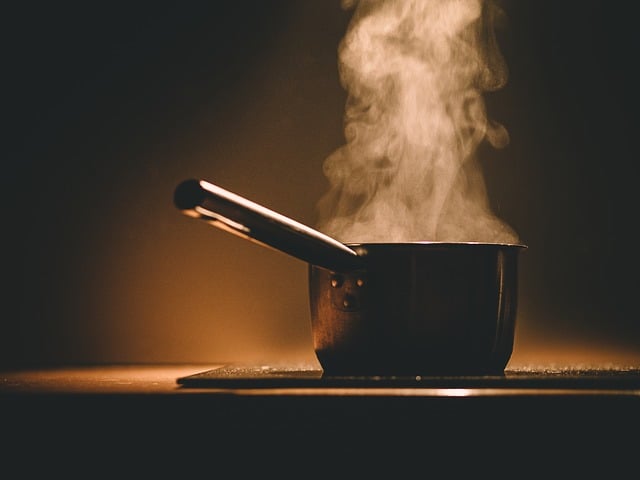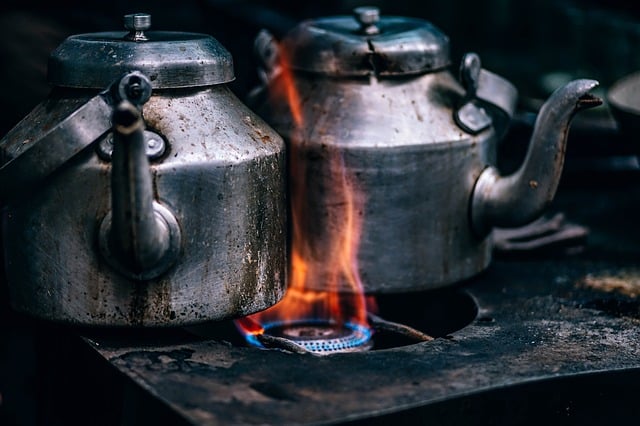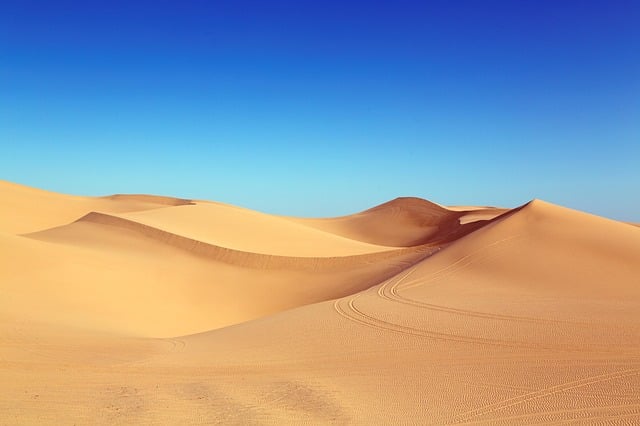what is the only substance to have a higher heat capacity than liquid water
If y'all've ever walked along a beach on a sunny day and dipped your toes in the h2o to cool them off after the hot sand, you've taken reward of the specific heat of water. Despite how information technology may audio, specific oestrus doesn't refer to the exact temperature of something. It's a larger scientific concept that has to do with the energy it takes to heat a substance upwards. As you lot might take noticed from the example, non all substances warm upwards at the same rate—hence the unlike temperatures of the sand and water. Water's specific heat is one of its virtually interesting characteristics. In this commodity, nosotros'll be covering what specific oestrus is, what equation you use to discover specific heat, and why water'south specific heat is so high. The stove, pot, water, and steam all have different specific heats. Specific heat is a measure of heat chapters, or how much heat a material tin can shop when irresolute temperature. A high estrus chapters means that a substance tin can absorb a lot of heat earlier registering a change in temperature—think virtually how long it takes for a pot to become warm to the touch on the stove versus how long it takes the h2o within to get warm. That means that h2o has a higher heat capacity—information technology can store more heat before changing in temperature. Specific heat refers to the exact amount of heat needed to make one unit of mass of a substance one degree warmer. Returning to our case, specific heat would identify exactly how much heat is required to make i unit of water, such equally 1 cup, 1 degree warmer. Considering rut is really a mensurate of free energy transfer, it's more than accurate to say that specific heat is actually a argument of how much free energy a substance can absorb before a one-degree change in temperature. Specific heat is typically measured in Joules and kilojoules per one gram of mass, with Celsius as a measure out of temperature. Kilograms and Fahrenheit may be used, but information technology's rarer. A substance's specific heat can be afflicted past temperature and force per unit area, so specific heat is typically determined at constant temperature and pressure, typically 25 degrees Celsius. The equation to calculate specific heat is: $$Q = s × m × ΔT$$ $Q$ represents the amount of estrus, $s$ the specific heat (${\Joules}/{\gram * °\Celsius}$), m the mass of the substance in grams, and $ΔT$ the observed change in temperature. Different kinds of water, such as seawater, may take different specific oestrus. Some substances heat up chop-chop, while other substances heat upwardly slowly. Water is one of the latter—it has a high specific heat capacity considering it requires more energy to raise the temperature. Water has a specific heat capacity of 4182 J/kg°C. Because water is such an important and common substance, nosotros even have a special fashion to place the amount of free energy it takes to raise one gram of water by one degree Celsius—a Calorie. This is dissimilar from the kind of calorie we talk about in food. That kind of calorie is equivalent to 1,000 Calories, which is why food-related calories are likewise sometimes referred to as kilocalories, or kcals. The specific heat of h2o is quite a bit higher than many other mutual substances. For instance, the specific heat of atomic number 26 is 449 J/kg°C, sand is 830 J/kg°C, and oak timber is 2400 J/kg°C. That's because water, comprised of 2 hydrogen atoms and one oxygen cantlet, is electronegative. An electronegative atom is more likely to describe electrons to itself, considering ane side of the atom will accept a partially positive charge and the other will have a partially negative charge. The opposite-charged sides are naturally drawn to one another, forming a weaker hydrogen bond. That'southward why h2o is able to menses past itself, simply also bond together—information technology'due south constantly forming and breaking these bonds. These bonds are also why liquid water has a high specific heat. Any free energy put toward heating water is split between breaking the bonds and heating the water. Because of this, it takes more energy to heat water than it does other substances. For case, if you lot're at the beach on a sunny day, you'll observe that the sand is frequently quite hot to walk on, just the h2o ever feels cool, even in the shallows. That's because sand has a lower specific heat capacity—it takes less free energy to raise the temperature by one degree. Because water has a high heat capacity, it requires more energy to raise the temperature by one degree. The sun puts out a more or less constant charge per unit of energy, which heats up sand more than speedily and h2o more than slowly. Sand has a much lower specific rut than water—that's why it gets hot so fast! If you lot're non already familiar with Joules and Calories, these numbers might seem a little abstruse. Have a look at this table to familiarize yourself with some common specific heats according to both Joules and Calories, and compare those to what yous know of how these substances rut up! Ready for more h2o-related science knowledge? Learn all about h2o-absorbing compounds (appropriately named hydrates) and the density of water. If the specific estrus of water has yous all fired up nearly chemistry, AP chemistry may be for you! Check out this AP chemical science syllabus to learn more than about what topics will be covered. Or maybe you lot're already in AP chemical science and you're looking for some tips and tricks for how to ace your examination. Bank check out this guide to the AP chemistry examination for everything yous need to know! If you're non quite gear up for the test but you need a little actress boost in your AP chemistry class, this AP Chemistry study guide may be just what you're looking for. 

What Is Specific Rut?

What Is the Equation for Specific Estrus?

What Is the Specific Rut of H2o?

Specific Heat Table
Material Specific Oestrus in J/kg°C Specific Heat in Cal/gram°C Gold 129 0.031 Air 1005 0.24 Leather 1500 0.36 Olive oil 1790 0.43 Paper 1336 0.32 Table Salt 880 0.21 Quartz Sand 830 0.19 Steel 490 0.12 Liquid Water 4182 i.00 Woods 1300 - 2400 0.41 What's Next?

Most the Author
Melissa Brinks graduated from the University of Washington in 2022 with a Bachelor's in English with a creative writing emphasis. She has spent several years tutoring K-12 students in many subjects, including in Sabbatum prep, to aid them prepare for their higher education.
Source: https://blog.prepscholar.com/specific-heat-capacity-of-water
Post a Comment for "what is the only substance to have a higher heat capacity than liquid water"